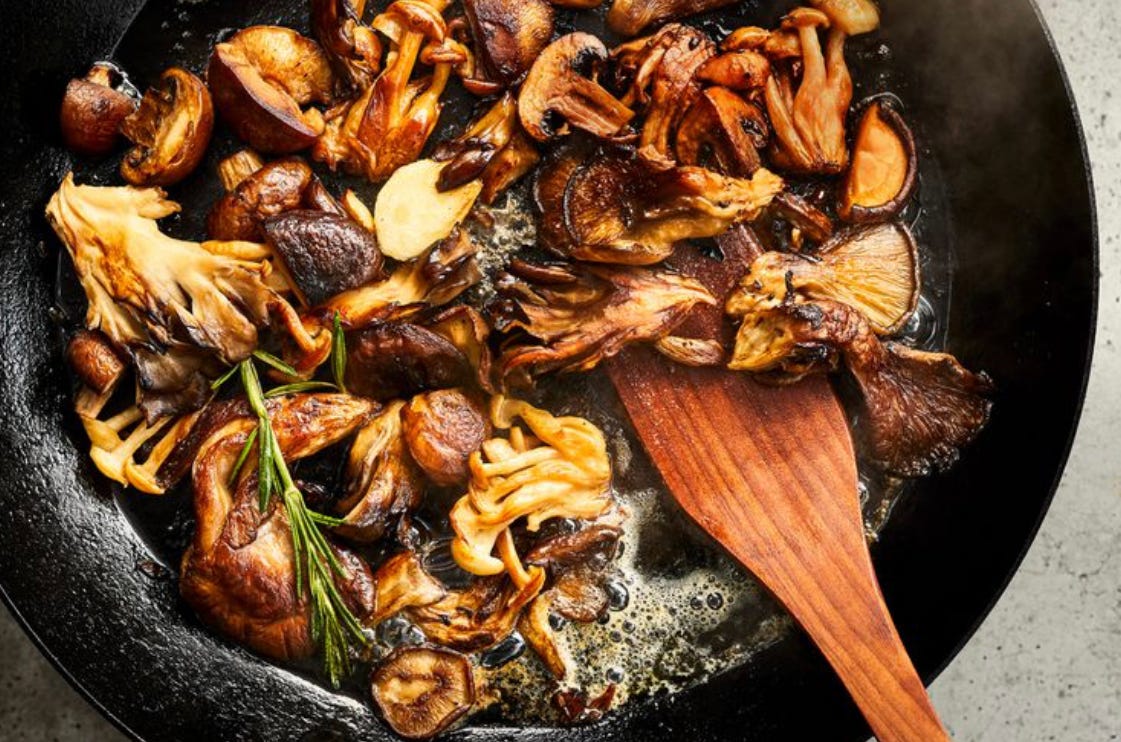The Lectio Letter - Issue #59 - To Hunger is Human | Part 2
He humbled you and let you be hungry, and fed you with manna which you did not know, nor did your fathers know, that He might make you understand that man does not live by bread alone, but man lives by everything that proceeds out of the mouth of the Lord.
— Deut 8:3
“Blessed are those who hunger and thirst for righteousness, for they shall be satisfied.
— Matt 5:3
Jesus said to them, “I am the bread of life; he who comes to Me will not hunger, and he who believes in Me will never thirst.
John 6:3
Welcome to Issue #56 of the Lectio Letter. This members-only newsletter is filled with music, film and food suggestions, links, and an article written by yours truly.
A New Home for the Lectio Letter
This is the first newsletter from the Lectio Letters new home on Substack. After the well-documented insanity unfolding at twitter after Elon Musk took over, they announced they were shutting down revue, the service I used to use.
That meant all my paid subscribers were automatically deleted, leaving me to start from scratch. I’m grateful to say, a few folks have moved over here with me, but if you are on the fence about signing up again, here’s a late Christmas present.
I’m giving 20% off a yearly subscription for anyone who subscribes before the end of the year.
This takes the normal $5 / £4 a month down to $4 / £3 a month. You get access to all 59 previous articles and help support my reading habit ; ).
If you are of a generous disposition and would like to gift a subscription to someone else, you can also do that below.
A couple of great new features that people have requested before now come with the move over to Substack;
You can listen to an audio version of the Lectio Letter through the Substack app.
If you are a paying subscriber you can now comment and respond to the Article.
Whether you become a paid subscriber or not, I’m very grateful to each of you who read and respond to this newsletter.
Introduction
Well, This is the second and final part of the short series “To Hunger is Human”, you can read Part 1 here, if you haven’t read that already.
Last time I reflected on how our hungers shape us, and that what we hunger for shapes us. This part reflects on the significance of who feeds us. As social animals we bond over eating, we connect to our parents, our friends and family through the meals we share. But who feeds us is deeper than that. It’s about who we receive our life from. I make the claim that it is not only that Adam and Eve ate the fruit in the garden that marked their fall, but that it is also about who they were allowing to be their provider.
Status Board
Life
Much like many of you, we’ve been feasting with friends and celebrating the Incarnation. This incredibly unlikely event, that God drew close in human form. I enjoyed how theologian Beth Felker Jones put it in her Christmas Eve blog;
Incarnation isn't God letting us out of the ordinary and into glory. It's the truth that ordinary is glory because God is here with us.
God embraces our flesh.
God made the ordinary. Loves the ordinary. Is bringing the ordinary into the kingdom that is glory all round.
Love holds our petty, restless anger, and love holds our deepest sorrow. It invites us to bring them to the Son of God.
Because Jesus isn't partly human and partly divine. He's all of God and all of us, in the one little person whose head Mary kissed as she held him close and inhaled his impossible, earthy newborn smell.
He's completely God and completely human.
Fully able to handle all our pain as only God can do.
Fully here with us, in that pain, so that we know how much he loves us. God and human in body and soul.
A Commercial Christmas can feel like a mad rush into a quick day leaving us spent (in all the ways that word can be used).
The Christmas of the Christian Calendar however offers us 12 days to soak in this extraordinary news.
News that God has come near and taken up in to the inside of God’s very own life, all that it means to be human through Jesus Christ.
Helena Fitzgerald in the Atlantic hails this week between Christmas and New Year as the best week of the year. I’m inclined to agree, the rush is over, expectations are low.
We celebrate Dead Week by having no idea what to do during Dead Week and, within that confusion, quietly luxuriating in what might be the only collective chance for deep rest all year.
A secular imagination has no idea how to luxuriate in celebration, only to anticipate and quickly consume. Christians have a chance to linger, in this so called “Dead week”. Everything undone, left undone, everything yet to do can wait until January.
Music
I’ve been listening to this Christmas Jazz playlist which has been a fun backdrop for present wrapping and the like..
Watching
Rachel is famously allergic to anything suspenseful in TV Shows, but the laid back pace of Christmas means some day time TV watching offsets the suspense, so we have dived into some good espionage.
Firstly, Slow Horses. An excellent suspenseful Apple TV series that follows the shenanigans of a disgraced MI5 station. Some bad Language (which somehow feels more forgivable in a Londoner-accent) and a few moments of bloodiness. But it’s not all intensity, the station commanders disdain (which hides his actual affection) for his team adds some light hearted moments.
Secondly, this time a US-based Netflix show, “The Recruit” follows a newly hired lawyer for the CIA getting himself too deeply involved.
Finally, we’ve watched a couple of movies;
Enola Holmes 2 (8/10)
and, Knives Out: Glass Onion (6/10)
Eating
Easy Step-Up Mushrooms
These slow Christmas days are perfect for some brunch! I managed to put a little extra care into some sauted mushrooms recently and they came out great. Here are the tips;
Use a little more butter than you are comfortable with (Mushrooms are basically sponges)
Mushrooms reduce as they release lots of water, so add a little more than you think you need.
Sauce some rough chopped garlic with it (about 2 cloves)
Add 2 whole sprigs of Rosemary and Thyme (you remove these at the end, but they add a great herby taste). If you have dried versions of these, you can sprinkle them in towards the end but fresh is much better.
A couple of pinches of smoked chilli flakes.
1 tablespoon of soy sauce for the umami and salt taste, then finish with a modest sprinkling of lemon to ‘wake up’ the mushrooms before serving.
Finish with some good coarse salt and black pepper
Enjoy!
To Hunger is Human | Part II
In the last lectio, I began to reflect on hunger. I argued that before we think, act or decide, we hunger. Our hunger can easily be for something that will deform us spiritually and yet make us act rightly. Our hunger shapes us and helps us answer the questions: Who am I and whose am I? The second question gets answered in children who experience a healthy upbringing and attach to those that feed them. So the question becomes who or what is feeding you?
I grew up in a single-parent family. We depended on government financial support to keep us from hunger. We had food, but it was rare to eat at the table with my family during the years of my upbringing. My father left our family suddenly after an extended deception which left us disoriented about what it meant to be a family at all. In the early years after my Father left our family, a well-meaning relative lent down to me and said, “You’ll have to look after your mum and sister now that your dad has gone.”
It was a well-meant rally to courage, but for a young and abandoned boy it buried deep in my bones the reality that no one was coming to look after us. While I am sure we did sit and eat together occasionally, what I do remember is reaching into the freezer for dinosaur-shaped breaded chicken, and cooking for myself. All of this seemed wholly normal to me, but little did I know I was practising an action that would quietly but firmly repeat the story that I could only rely on myself.
In my teenage years, after a short but concerted effort to carve a way for myself, I found myself aloof and searching for meaning and belonging. Despite some sincere attempts to derail my life, I found myself at a table. At around 16, I joined an evangelical church. In the beginning, the services were just about bearable but what was truly transformative were the lunches around the table of the pastor and his family.
Over the following years, I spent more and more time with this family, effectively living with them and was being fed in more ways than one. I learned that those you ate with, and those that fed you, formed you. There was a culture of question-asking, curiosity for visitors, collaboration and service with one another. While I was eating this family’s food, I was also feasting on their welcome. Mealtimes were full of affirmations, corrections and a rich sense of what it meant to live well. In these years, my tightly wound self-reliance began to be unwound in a context that fed me within family and in the presence of God.
My hunger for belonging, created by the absence of my father, led me to a table where I began to learn how to hunger for God. Slowly (and imperceptibly at first), I began to realise that I didn’t have to feed myself. Somehow, this family I was attaching to through shared meal times would feed me too. The not-so-subtle lie that I had to depend on myself was beginning to unwind in the midst of relationships formed around a dinner table. These meal times were an appetite-training context. My hunger for belonging was being satiated and my hunger for becoming was emerging. Who did God want me to become, now that I was assured that I had people who would be there for me?
Returning to the creation narrative from Genesis, I want us to consider the garden as a place designed for appetite-training. In our modern imagination, the garden can be simplified as a place where a moral decision was made, but before morality came hunger. Similarly to the dinner table I was welcomed to, the garden was a place of abundant provision in the context of deep relationship. While we quickly fixate on the command not to eat of the tree of the knowledge of good and evil, the preceding sentence is an invitation to eat from every other tree in the garden. This is the ultimate farm-to-table banquet! In the context of a relationship with their Father, the first humans are provided for in abundance. They are being fed by and attached to the Creator of the Garden and their hunger is being trained by not eating from the tree of the knowledge of good and evil.
This next part of the story may be puzzling to us. It can seem that God has somehow laid a trap for the first humans, that somehow he has placed kids in a room with a mars bar in a mouse trap. But this is not what is going on. Although we sometimes think of the garden and the first humans as in a state of perfection, Genesis never uses that word to describe it. Everything is not perfect, everything is potential. Looking again at the story, we see that the land, animals and the relationships themselves are to be cultivated in order to grow. Adam and Eve are commissioned to partner with God to cultivate and extend the borders of the garden that increases this location of presence, beauty, order and abundance. Adam and Eve themselves, when depicted in certain ages of Christian history are pictured as children. Might it be that the command to not eat from the Tree of the Knowledge of Good and Evil is not a command to never eat from the tree, but a command to not yet eat of the tree?
We get a glimpse of this likelihood when we fast forward to King Solomon. In 1 Kings 3:9, Solomon prays for the knowledge to discern between good and evil and verse 10 tells us that the Lord was pleased he had asked for such knowledge. Adam and Eve were not yet at a stage of maturity to receive such knowledge, but God was training them to rule and ultimately grow up into an ability to discern between good and evil. The issue is not then whether they ate or not, but who they were allowing to feed them. The fall of Eden is not only that they had experiential knowledge of good and evil, but that they allowed their hunger to be fed by the serpent. We attach to the ones who feed us.
We see a broken educational environment in Genesis 3 where the first humans gain a kind of knowledge by being fed by the serpent without the appropriate moral and spiritual formation.
The students in our M.A. programme are about to embark on a journey of knowledge acquisition and it will be a tough road. When we walk through challenging circumstances we are often in a space ripe for reflection on what hunger is driving us. Walking through difficult times can be a fresh kind of training to discern the hunger that leads us. We often have at least two paths through difficult assignments. The first is to simply grind it out and get it done. This in itself is a kind of spiritual formation in self-reliance. The second option is that we use these spaces to train our hunger again, and to be led rather than driven down a path of deeper dependence and hunger for God who longs to give us good things in his own time.
So which table are we feasting at? Which hunger is forming us? One way or another we will be fed, but will it be by the one who offers us his very self as the bread of life, or by the one who encourages us to depend on ourselves rather than trust God. When Jesus, through his life and spirit liberates us from the devil's power, he says, “this is my flesh, this is my blood, take and eat.”
What hunger brought you to this current place in your life? Maybe this is the time to re-train that hunger to feast on the only one who can truly give you life.
When our disordered hunger leads us to receive life from and be fed by something other than God, rather than running away in shame and hiding, let us remember that we are found and redeemed in the One who welcomes us to His table.
What does Jesus do for the people he has brought out from under the devils power? He feeds us.
This is my flesh, this is my blood.
Take and eat.
Miscellaneous Links
A series of photos that look human…
Pareidolia. a psychological phenomenon that causes people to see a familiar image in a random stimulus
An amazing list of words with Arabic Origins;
Jumper: jubbah جُبَّة The Arabic word for overcoat originally entered European languages as "juppah", valuable silk clothing, in southern Italy in the 11th century
Safari: safar سفر The English adopted the Swahili word for journey – safari – in the 19th c. for their hunting expeditions in East Africa. The origins of the word are from the Arabic "safar" or journey
Algebra: Aljabr الجَبْر Founded by Jaber bin Heyan, the field of Algebra or Aljabr (الجَبْر) as it was originally named is one of the most important branch of mathematics in which letters & symbols are used to represent unknown numbers
Mattress: Matrah مطرح Sleeping on cushions was actually an Arabic invention. Were it not for Arabic matrah, a place where the cushions were thrown down, the Europeans would never have adopted materacium/materatium (Latin) which passed through Italian into English as mattress
Why Dying is forbidden in the Arctic
It is forbidden to die in the Arctic town of Longyearbyen.
Should you have the misfortune to fall gravely ill, you can expect to be despatched by aeroplane or ship to another part of Norway to end your days.
And if you are terminally unlucky and succumb to misfortune or disease, no-one will bury you here.
The town's small graveyard stopped accepting newcomers 70 years ago, after it was discovered that the bodies were failing to decompose.











